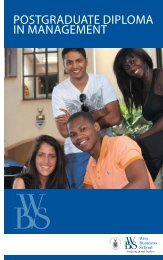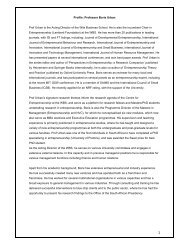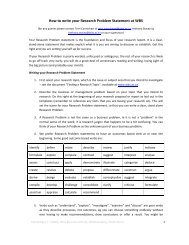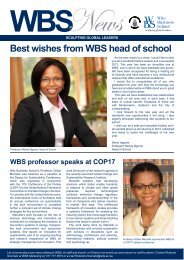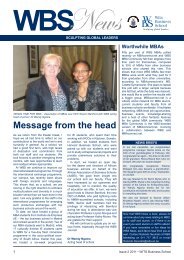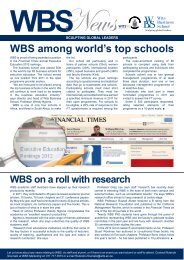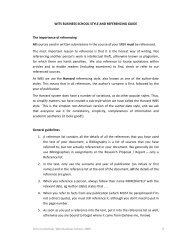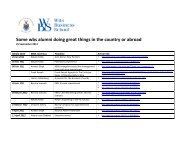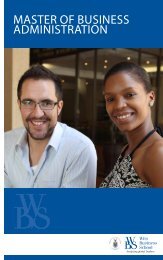WBS Newsletter Issue 5 2011 - Wits Business School
WBS Newsletter Issue 5 2011 - Wits Business School
WBS Newsletter Issue 5 2011 - Wits Business School
You also want an ePaper? Increase the reach of your titles
YUMPU automatically turns print PDFs into web optimized ePapers that Google loves.
<strong>WBS</strong>News<br />
SCULPTING GLOBAL LEADERS<br />
New Leadership at <strong>WBS</strong><br />
Director and head of <strong>Wits</strong> <strong>Business</strong> <strong>School</strong>, Professor Wendy Ngoma<br />
As of 1 September, Professor Wendy<br />
Ngoma is officially <strong>WBS</strong>’s director and<br />
head of school. This appointment follows<br />
Ngoma being acting head of school for<br />
more than a year.<br />
She was initially selected for the acting<br />
position from within the school, having<br />
taught at the Graduate <strong>School</strong> of the<br />
Public and Development Management<br />
<strong>School</strong> at <strong>Wits</strong> University for 11 years,<br />
before joining <strong>WBS</strong> in 2008 as a senior<br />
lecturer in organisational development<br />
and human resources.<br />
Her areas of expertise include<br />
change management, organisational<br />
transformation and restructuring,<br />
social entrepreneurship and human<br />
resource management. She completed<br />
an internationally acclaimed social<br />
entrepreneurship programme at Insead<br />
in France in 2009. She was chosen as<br />
one of the Crans Montana Forum’s New<br />
Leaders of Tomorrow for African and Arab<br />
countries in 2010.<br />
Ngoma views being head of the school<br />
as a learning and growth curve. She sees<br />
her role as one of guiding and facilitating.<br />
“I see it as working on relationships,<br />
empowering people to do their jobs the<br />
best way possible and assisting them in<br />
any way that I can,“ she says.<br />
Her primary focus is to sustain <strong>WBS</strong>’s<br />
UPCOMING EVENTS<br />
12 October <strong>2011</strong> – STANLIB chief<br />
economist Kevin Lings will speak on<br />
‘A new world order… how big are the<br />
structural changes in the world?’ He will<br />
give insights from a recent International<br />
Monetary Fund meeting where finance<br />
ministers and Europe’s policy officers<br />
discussed the future of leading world<br />
economies. The talk will be held at the<br />
Bert Wessels lecture theatre at 5pm for<br />
5.30pm. Admission is free.<br />
29 October <strong>2011</strong> – The theme for the <strong>2011</strong><br />
<strong>WBS</strong> Annual Alumni Open Day is ‘Africa<br />
into the next decade: the challenges we<br />
face’. The keynote speakers include Phuti<br />
Malabie, CEO of Shanduka Group, and<br />
Sifiso Dabengwa, CEO of MTN Group.<br />
Join us for a thought-provoking networking<br />
day between 9am and 3pm. A lunch hosted<br />
by <strong>WBS</strong> head of school, Professor Wendy<br />
Ngoma, will be included. All alumni, make<br />
sure you don’t miss this event<br />
NEWS BRIEFS<br />
We are sad to bid farewell to director of<br />
international programmes Professor John<br />
Luiz, Master of Management in <strong>Business</strong><br />
and Executive Coaching programme<br />
director Natalie Cunningham, and Annette<br />
Mouton, who was the academic director’s<br />
PA.<br />
We would like to congratulate those<br />
who graduated with their MBA and PDM<br />
recently. We wish you luck and success in<br />
your careers!<br />
priority of remaining a leading graduate<br />
business school. “As a leader, it is my duty<br />
to ensure that <strong>WBS</strong> reclaims its position<br />
in the market through quality products,<br />
teaching and research,” she says. Ngoma<br />
adds she regards this experience as an<br />
opportunity to grow as a leader, and sees<br />
her leadership in a broader context.<br />
“I respect those who have led this<br />
institution over the last 40 years. I see this<br />
as continuity and I have inherited a good<br />
school, despite its previous challenges.<br />
Our role is to inject new ideas through<br />
academic creativity and innovation while<br />
building a graduate school that we can all<br />
be proud of.”<br />
Please keep us all up to date! Let us know about any news relating to <strong>WBS</strong>, its staff and alumni, or if there is an event you want alumni or staff<br />
to attend. If you have innovative or fun ideas for <strong>WBS</strong> News, we’d like to hear from you as well. Contact Rutendo Nxumalo at <strong>WBS</strong> Marketing on<br />
011 717 3615 or e-mail Rutendo.Nxumalo@wits.ac.za.
PAGE 2<br />
Vodacom leaders learn at <strong>WBS</strong><br />
Almost as soon as the 2010 Vodacom<br />
Advanced Executive Programme group<br />
graduated recently, so the <strong>2011</strong> intake<br />
began their course at <strong>WBS</strong>.<br />
This programme is exclusive to<br />
candidates who are executive heads<br />
of divisions at Vodacom, and includes<br />
staff from all over Africa. In the <strong>2011</strong><br />
group, there are students from Nigeria,<br />
Mozambique, Lesotho, Tanzania and<br />
South Africa.<br />
The students get a unique opportunity<br />
to acquire cross-functional knowledge that<br />
they can later utilise in the workplace. While<br />
there is an obvious telecommunications<br />
focus, this programme provides training<br />
in a range of areas including leadership,<br />
finance, statistic, global business, strategy<br />
and change management.<br />
<strong>WBS</strong> runs an extensive business<br />
simulation element that provides the<br />
students with hands-on experience in<br />
what they are learning. There is also an<br />
integrated learning process, in which<br />
the students take real, burning issues<br />
from Vodacom and find solutions. <strong>WBS</strong><br />
Leadership Development Centre director,<br />
Professor Drikus Kriek, says: “What<br />
stands out about this is that, at the final<br />
presentation, Vodacom CEO Pieter Uys<br />
designated two executive committee<br />
members to investigate implementing the<br />
results of the integrated learning process.<br />
As I understand, some of them have<br />
already been implemented.”<br />
Kriek explains that, as demonstrated<br />
with the Vodacom programme, <strong>WBS</strong><br />
customises certain courses for corporates,<br />
which has been found to be extremely<br />
effective for the companies concerned.<br />
<strong>Issue</strong> 5 <strong>2011</strong> • WITS <strong>Business</strong> <strong>School</strong><br />
Enthusiastic Vodacom executive heads of divisions embark on the <strong>2011</strong> Vodacom Advanced<br />
Executive Programme at <strong>WBS</strong><br />
An international exchange<br />
student view on <strong>WBS</strong><br />
It is easy to be cynical about <strong>WBS</strong>, but<br />
when foreign students laud our school, it<br />
should give us a renewed respect for the<br />
work done here.<br />
Here are extracts from three exchange<br />
students’ messages:<br />
Jean-Stéphane Phinera-Horth is from<br />
French Guiana and is doing his MBA<br />
at HEC Paris.<br />
“I wanted to complete my international<br />
exposure in Africa and get a glimpse at<br />
African leadership. I received far more<br />
than I had expected. I was really stunned<br />
by the quality and experience of the<br />
teachers. I definitely appreciated the<br />
collaborative spirit during work groups<br />
and I made lifelong friends. It is without<br />
hesitation that I would recommend <strong>WBS</strong><br />
as a first-class business school.”<br />
Gianluigi Andreoli is studying<br />
management at Bocconi University in<br />
Milan, Italy.<br />
“The experience I had in South Africa is the<br />
most beautiful experience that I had during<br />
my studies and one of the best of my life.<br />
“Regarding <strong>WBS</strong>, the campus is<br />
beautiful, the accommodation is ready<br />
to satisfy all the needs of the exchange<br />
students, the courses are very interesting<br />
and the home students and the lecturers<br />
are very open and welcoming with foreign<br />
students.<br />
“Everything works very well and the<br />
organisation is very close to the European<br />
standards.<br />
“I will never forget South Africa, <strong>WBS</strong><br />
and all the fantastic people that I met<br />
there.”<br />
Melania Spagnoli is from Italy and<br />
is doing an MSc in management at<br />
Bocconi University.<br />
“I chose <strong>WBS</strong> because having an<br />
exchange experience in South Africa was<br />
my childhood dream, and <strong>WBS</strong> is known<br />
as the best business university in South<br />
Africa.<br />
“This experience has been the greatest<br />
of my life. I feel so blessed to have had<br />
such a great time there, for having known<br />
people that, even if they don’t realise it,<br />
are able to ‘enjoy diversity’. <strong>WBS</strong> campus<br />
is awesome and offers the students all the<br />
comforts. I never felt lost or alone there;<br />
I actually had the feeling I was home.<br />
Before I left home, I was positive I would<br />
have an amazing experience, but what<br />
I experienced was even better than my<br />
expectations.”<br />
If you do not want to receive this newsletter, please reply to this e-mail with ‘unsubscribe newsletter’ in the subject line
PAGE 3<br />
<strong>Issue</strong> 5 <strong>2011</strong> • WITS <strong>Business</strong> <strong>School</strong><br />
MBA students tackle social entrepreneurship<br />
Students from the MBA part-time Saturday<br />
Class of 2013 were determined not to<br />
let winter pass without helping the less<br />
fortunate. And Mandela Day on 18 July<br />
provided a perfect opportunity for them.<br />
They had already bought R3 000 worth<br />
of blankets, but they wanted to do more<br />
than just give them away. So they set up a<br />
football tournament in Parktown between<br />
themselves and the iKAGENG Soccer<br />
Club, made up of around 30 young men<br />
affected by HIV/AIDS.<br />
The students arranged transportation<br />
for the club members. They also sourced<br />
a photographer, soccer balls and football<br />
caps (donated by <strong>Wits</strong>), and provided<br />
lunch for the players.<br />
Head of school Professor Wendy<br />
MAP student – a young<br />
African woman leader<br />
When Management Advancement<br />
Programme (MAP) student Refiloe<br />
Seseane asked her fellow students to<br />
excuse her from a few classes in June,<br />
she had an excellent excuse. She was one<br />
of 76 women from around the continent<br />
who had been selected to attend the <strong>2011</strong><br />
Young African Women Leaders’ Forum,<br />
to be held in Johannesburg with United<br />
States First Lady Michelle Obama.<br />
She was selected for the work she has<br />
done in empowering young South African<br />
women with her non-profit organisation<br />
18twenty8, which aims to help previously<br />
disadvantaged women between the<br />
ages of 18 and 28 by developing<br />
strategies for their educational and<br />
personal development. Seseane started<br />
the company in 2008 when, at 28, she<br />
realised she would have got further faster<br />
if she had had someone mentoring and<br />
supporting her. She decided to be that<br />
support for others.<br />
Last year, Destiny magazine wrote<br />
about Seseane, who is also an<br />
accomplished television actress and<br />
presenter, and her company. The features<br />
editor introduced her to a woman who<br />
While the iKAGENG Soccer Club may have won the tournament, members of the <strong>WBS</strong> MBA team<br />
were also justified in feeling like winners<br />
Ngoma also attended the game. MBA<br />
student and one of the event organisers,<br />
Natasha John, says: “Professor Ngoma is<br />
as passionate about social responsibility<br />
as we are, and we were most grateful<br />
to have her demonstrable support and<br />
enthusiasm.<br />
“It was a great day. Their team<br />
unashamedly beat our <strong>WBS</strong> boys 3–1.”<br />
An offshoot of this event was that one<br />
Refiloe Seseane... leader, entrepreneur, mentor<br />
and <strong>WBS</strong> student<br />
of the MBA students arranged to facilitate<br />
employment opportunities for some<br />
of the iKAGENG players through his<br />
employment organisation. Some young<br />
men have already been for interviews.<br />
Relationships were also formed. Some<br />
weeks later, a couple of students went to<br />
support “our <strong>WBS</strong> boys” playing soccer in<br />
Sunninghill. “It was wonderful to interact<br />
with them again,” says John.<br />
was passionate about social upliftment,<br />
who nominated Seseane for a 2010<br />
Inyathelo Philanthropy Award, which she<br />
won in the youth section.<br />
At the awards ceremony, she met<br />
US ambassador Donald Gips and his<br />
wife, Elizabeth, who sent Seseane an<br />
e-mail asking her to nominate women<br />
she thought could be eligible as forum<br />
members. “I sent her a list of names,<br />
never thinking that she wanted me to<br />
include myself,” says Seseane. Gips<br />
called her to say she and one of her<br />
company’s beneficiaries had been<br />
chosen from sub-Saharan Africa as part<br />
of the forum. Seseane was thrilled.<br />
“It was eye-opening to hear about the<br />
challenges and opportunities that women<br />
address in their home countries,” says<br />
Seseane. “It became clear that despite<br />
linguistic, cultural and geographic<br />
boundaries, our experiences and vision<br />
for the continent were all the same.”<br />
The forum gave Seseane the<br />
opportunity to meet and engage with<br />
Obama and young women leaders<br />
from all over the continent, and form a<br />
lasting network. “Being a forum member<br />
enables me to raise the profile of my<br />
company and learn from peers who are<br />
dedicated to creating a positive future for<br />
Africa,” says Seseane.<br />
If you do not want to receive this newsletter, please reply to this e-mail with ‘unsubscribe newsletter’ in the subject line
PAGE 4<br />
SA needs to invest more in talent<br />
Talent management expert Jeremy Langley<br />
speaking at <strong>WBS</strong><br />
Talent management has become<br />
unnecessarily complex, says Jeremy<br />
Langley, an international talent<br />
management expert who was recently in<br />
South Africa from the United Kingdom.<br />
Langley, regional director of Lumesse<br />
(Western Europe, Middle East and Africa) –<br />
a company that specialises in making<br />
global talent management work locally –<br />
shared his vision for talent management<br />
during a Distinguished Lecture at <strong>WBS</strong>.<br />
He explains that talent management is<br />
not only something for the privileged or<br />
for global enterprises. “It is something that<br />
you can do in any business, any day of<br />
the week, if you have the right mindset,”<br />
he says. “It is as simple as proactively<br />
ensuring that you have the right people, in<br />
the right place at the right time.”<br />
Langley says that what was labelled the<br />
war for talent in America and Europe in<br />
1997 – when it became particularly difficult<br />
to recruit and retain talented staff – wasn’t<br />
<strong>WBS</strong> short courses<br />
Specialised topics<br />
Finance<br />
Leadership Development<br />
Centre programmes<br />
Project Management<br />
14–18 November <strong>2011</strong> (JHB)<br />
even a skirmish compared to South Africa,<br />
where we have an acute shortage of key<br />
talent. He points out that South Africa’s<br />
high unemployment rate is not dropping.<br />
Other factors like the complex regulatory<br />
environment, an education system that<br />
doesn’t serve its stakeholders and a high<br />
turnover of key talent contribute to creating<br />
“the perfect storm”, he says.<br />
“It’s curious that a country with such a<br />
challenging environment for recruiting,<br />
managing, developing and retaining talent<br />
has invested so little in it,” he says.<br />
Langley says performance management<br />
is a good place to start when going back to<br />
basics, because it builds your organisation<br />
and enables you to grow your own talent.<br />
He explains that people hate the<br />
performance management cycle,<br />
because it is an event and not a process.<br />
“Somehow we’ve managed to suck the<br />
life out of performance management.<br />
We’ve sucked it dry until it’s become<br />
an administrative challenge and not a<br />
development opportunity.”<br />
Research has shown that companies<br />
that issue systematic goal-setting<br />
programmes enjoy a 39% increase in<br />
productivity, on average. “Employees<br />
don’t understand the relationship between<br />
their compensation and their performance.<br />
In many cases, there is none... So when<br />
we look at great organisations that do<br />
performance management well, they<br />
actually do build in an element of payment<br />
on results. If you succeed, you will be<br />
rewarded more,” says Langley.<br />
Robust performance management is<br />
also fantastic for employee retention, he<br />
says. But loyalty is a thing of the past.<br />
Langley insists that while you can<br />
throw money at high performers and high<br />
potentials to try to keep them, businesses<br />
should try giving less money and instead<br />
stretch employees a little further and<br />
reward them if they perform.<br />
“Lots of research points to the fact that<br />
people will outperform if you give them<br />
stretched goals, rather than if you give<br />
them achievable goals,” he says.<br />
Integrating Strategy, Budgeting and Reporting<br />
3–5 October <strong>2011</strong> (JHB) (Private sector)<br />
24–26 October <strong>2011</strong> (JHB) (Public sector)<br />
Personal Effectiveness Through Emotional Intelligence<br />
18–21 October <strong>2011</strong> (JHB)<br />
Leadership for Results<br />
10–12 October <strong>2011</strong> (JHB)<br />
CONTACT DETAILS<br />
Rutendo Nxumalo • Tel 011 717 3515 • E-mail Rutendo.Nxumalo@wits.ac.za<br />
<strong>Issue</strong> 5 <strong>2011</strong> • WITS <strong>Business</strong> <strong>School</strong><br />
<strong>WBS</strong> PhD<br />
student<br />
presents<br />
to world<br />
conference<br />
<strong>Wits</strong> <strong>Business</strong> <strong>School</strong> PhD candidate,<br />
Graunt Kruger, presented a paper on early<br />
findings in his research at a conference in<br />
Italy in July. It was the first time that a <strong>WBS</strong><br />
PhD student had been asked to present<br />
at the Critical Management Studies<br />
Conference, which draws hundreds of<br />
academics from around the world.<br />
Kruger is a second-year PhD student<br />
working under the supervision of<br />
Professor Louise Whittaker. The working<br />
title of his research is ‘Turning on Tembisa:<br />
a comparative discourse analysis of<br />
electronic banking in a local economy’.<br />
Kruger’s paper set out to compare<br />
critically the disparate worlds of large<br />
corporations and retailers operating in a<br />
local economy. The context of examining<br />
the different discourses was a project<br />
that brought the two into partnership.<br />
Using a conceptual framework based<br />
on the work of the French postmodern<br />
philosopher Michel Foucault, the research<br />
applied Foucauldian Discourse Analysis<br />
(FDA) to three texts. The methodology<br />
brought to the surface questions about<br />
the assumptions used in organisations;<br />
in particular, assumptions relating<br />
to the need to address ‘poverty’ and<br />
‘underdevelopment’ through the extension<br />
of formal financial services under the label<br />
of financial inclusion.<br />
The research brings into question the<br />
primary assertion by financial services<br />
institutions that financial inclusion and<br />
its accompanying electronic banking<br />
technologies are to the benefit of new<br />
customers in a local economy like<br />
Tembisa. While this uncritical acceptance<br />
of the status quo in the development of<br />
banking technologies remains largely<br />
unchallenged, this paper brought<br />
contradictory issues to light, such as the<br />
tension between the desire of retailers to<br />
give their stores status, with the potential<br />
consequences of being monitored by<br />
external parties.<br />
The research showed that banking<br />
technologies could act as disciplinary<br />
techniques, enabling large financial<br />
institutions to monitor the retailers. At the<br />
same time, the desire of retailers to have<br />
these technologies was expressed, since<br />
they felt they would add an element of<br />
status and credibility to their stores.<br />
The paper was well received and placed<br />
<strong>WBS</strong> on the global map in terms of critical<br />
research. Kruger is due to complete his<br />
work in 2013.<br />
If you do not want to receive this newsletter, please reply to this e-mail with ‘unsubscribe newsletter’ in the subject line



